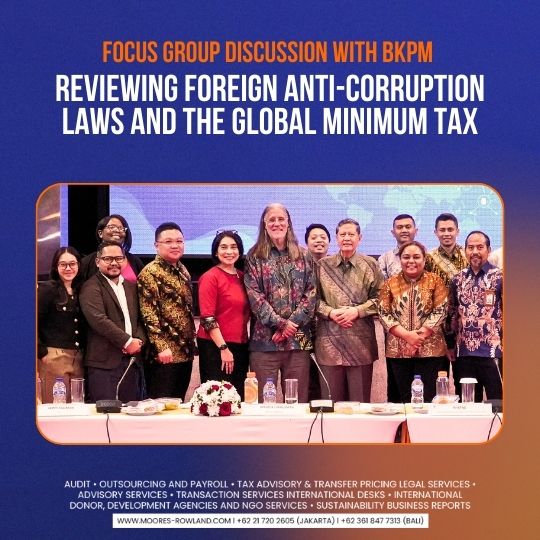Focus Group Discussion: Reviewing Foreign Anti-Corruption Laws and the Global Minimum Tax.
October 2024
On October 8, 2024, facilitated by Moores Rowland Indonesia, the Ministry of Investment (BKPM) held a focus group discussion (FGD) on the Foreign Legal Implications Relevant to Indonesia's Economic Governance: Reviewing Foreign Anti-Corruption Laws and the Global Minimum Tax.
The FGD was attended by representatives from relevant ministries and agencies, such as the Ministry of Foreign Affairs, the Corruption Eradication Commission (KPK), and Bank Indonesia.
The event was opened by Mr. Riyatno, Deputy of Investment Climate Development at BKPM, followed by remarks from Mr. Marzuki Darusman, Senior Advisor at Moores Rowland Indonesia.
Mr. Marzuki then opened the FGD with an introduction to the Foreign Corrupt Practices Act (FCPA) and the Foreign Extortion Prevention Act (FEPA).
Dr. Unang Mulkhan, Senior Human Rights Specialist at Moores Rowland Indonesia, then spoke about the OECD Anti-Corruption Regulation. Moores Rowland's Human Rights Specialist, Ratih Ananda Putri, then followed with a deeper explanation of the FCPA and FEPA.
The Corruption Eradication Commission (KPK) representative responded and highlighted Indonesia's laws on corruption related to the new FCPA regulation, followed by a KPK review that showed that the majority of corruption occurs in the private sector. Referring to a 1999 law, the KPK has limited authority, and cannot prosecute provincial companies that bribe officials in the United States. This suggests that some laws in Indonesia need to be adjusted so that foreign laws can be enforced here. The Ministry of Foreign Affairs stated that extraterritorial jurisdiction for corruption issues should be automatically applied in Indonesia, which Indonesian Embassies will support.
The event continued with an explanation of the OECD's second pillar of Global Tax Regulation: GloBe, by Mr. Dicky Darmawi, Head of the Moores Rowland Indonesia Tax Division.
The BKPM Director of Promotion for Southeast Asia, Australia, New Zealand, and the Pacific, Mr. Saribua Siahaan, and representatives from Bank Indonesia actively asked questions, including one regarding the implementation of GloBe for investors during the tax holiday period.
Mr. James Kallman, the CEO of Moores Rowland, also offered some ad hoc remarks about Indonesia’s responsibilities if it wanted to become a top trading nation and an OECD member.
Some of the inputs submitted in the FGD included that the current regulations in Indonesia do not cover corruption committed private sector to private sector, so it is necessary to learn more about FCPA and FEPA as they relate to the Indonesia investment climate. The need for the involvement of Fiscal Policy Agency, Ministry of Finance of the Republic of Indonesia (BKF), the Ministry of Finance, and other stakeholders to review tax revenue in Indonesia was also discussed. In addition, an in-depth study of typical investors from the US and OECD countries who understand issues beyond only technical investment and licensing is also needed. The implementation of international standards also needs to be well prepared for OECD accession.
The purpose of FGDs like this is to disseminate the needed relevant information. Going forward, it is hoped that more stakeholders will be involved, and other relevant ministries will consider conducting more in-depth training on global corruption and tax regulations to keep up with global investment trends.


